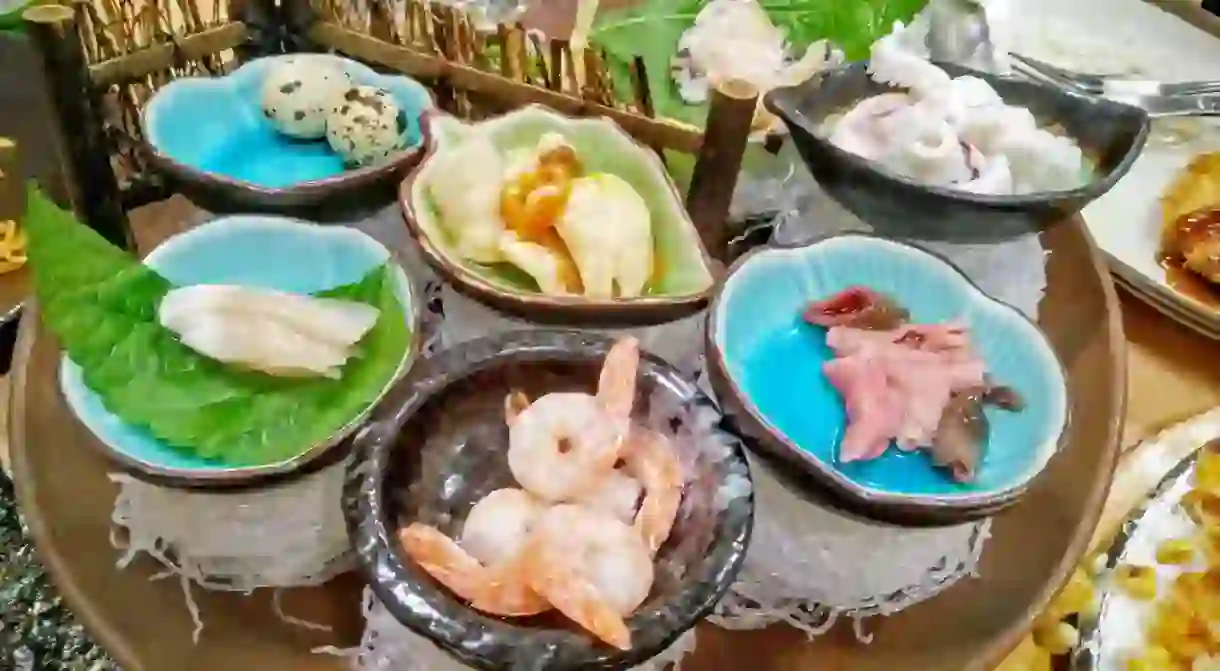8 Delicacies to Try in Jeju and Where to Try Them

For such a tiny island, Jeju is packed full of specialty dishes. From rich black pork to abalones plucked fresh from the ocean by Jeju’s very own ‘mermaids’, there are plenty of delicacies to try. Here’s a selection of Jeju’s best dishes to whet your appetite, and our suggestions for places to try them.
Donsadon
Restaurant, Korean

Myeongjin Jeonbok
Restaurant, Korean

Jeju is famous for its abalones, and Myeongjin Jeonbok is one of the most popular abalone restaurants on the island. Abalones are traditionally harvested by haenyeo, Jeju’s ‘mermaids’ — female divers who descend to depths of up to 15 metres to collect delicacies such as octopus, sea urchins, oysters and other shellfish, including abalones. Myeongjin Jeonbok has just four dishes on the menu — abalone sizzling stone pot rice, grilled abalone, rice porridge with abalone and sliced raw abalone. This means that each dish is honed to perfection. The ingredients are fresh and delicious, and the restaurant is good value for money compared to other similar establishments. Expect to wait for a table, as it’s a popular spot.
Deomjang Jungmun
Restaurant, Korean

For the Jeju specialty dish godeungeo gui — grilled mackerel cooked to perfection — head to Deomjang Jungmun in Jeju city. The mackerel is served with a wide variety of complementary side dishes, and portions are sizeable and good value for money. Mackerel is particularly well-loved in Jeju because it’s inexpensive, and in the hands of a skilful chef, there is a delicious counterpoint between the fish’s soft, slightly sweet flesh and crispy, sizzling skin.
Samsunghyeol Haemultang
Restaurant, Korean

Friendship Sashimi Restaurant
Restaurant, Korean

Fresh sashimi is a sought-after delicacy all over Korea. Mouth-watering slices of raw seafood are served with side dishes and a mixture of soy sauce and fresh chilli for dipping. Look out for street food tents (or pojangmacha) all over Jeju, or head to a specialty sashimi restaurant such as Friendship Sashimi Restaurant, which has great views over the Jeju seafront.
Manna Sikdang
Restaurant, Korean

Guksu Madang
Restaurant, Korean

Guksu Madang’s specialty dish is momguk, or gulfweed soup. Pork bones are boiled to make broth, and flavoured with onions, sour kimchi and vegetables. The star ingredient is gulfweed, a seaweed known as ‘mom’ or ‘mojaban’ in the Jeju dialect. Momguk is a dish unique to Jeju, and cannot be found elsewhere in Korea. The dish’s history lies in Jeju’s past: with a climate that included harsh sea winds and cold weather, the island’s crops were vulnerable to failure, and so the Jeju natives turned to seaweed for a reliable source of nutrition. Momguk was traditionally served at family gatherings and events.
Osulloc Tea Museum
Museum

Warm Jeju summers lend themselves well to the cultivation of sweet fruits. One of Jeju’s most famous specialties is the tangerine, and tangerines from Jeju are highly prized all over Korea — there are records of tangerines being grown on the island since the 13th century. You can buy all manner of tangerine-flavour foods throughout Jeju, and fresh tangerines are readily available in markets and shops. For a two-in-one double whammy of Jeju specialty foods, head to the Osulloc Tea Museum, where you can sample Jeju tangerine tea. In this delicious brew, sweet tangerine peel is mixed with Osulloc’s famous Jeju-grown tea to create a warm, rich flavour profile. You can also learn about Jeju tea cultivation during your visit.













